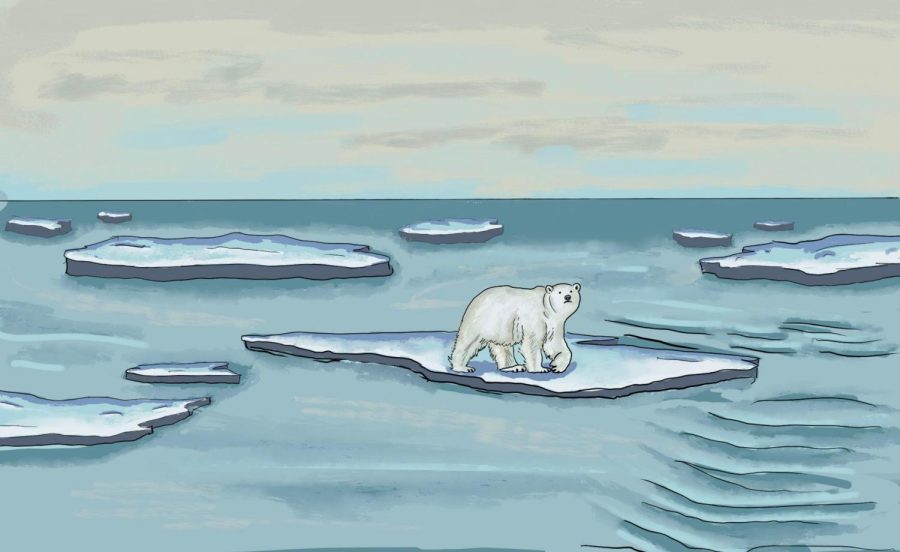Willow Project has Far-Reaching Implications
The Willow Project, a massive oil-drilling initiative in Alaska, has been trudging through its permitting process since 2018, but the Biden administration is set to make a final decision regarding its progression in March of 2023.
The proposed project calls for the drilling of the Alaskan North Slope in order to obtain the large amounts of petroleum known to be stored there. According to the New York Times, doing so could produce up to 180,000 barrels of oil a day. This would be the biggest United States oil field in decades.
Due to less reliance on Russian oil because of war in Ukraine, pressure to find alternatives has grown in the U.S. While the Willow Project would increase the U.S.’s oil supply and have economic benefits, its environmental implications are terrifyingly severe. According to a statement from the U.S. Department of the Interior, the project would emit at least 278 million metric tons of carbon dioxide over the span of 30 years, as a result of the burning of the oil it produces and the construction required at its site. The consequences of that level of emissions would be devastating — accelerating the process of climate change and irreversibly destroying wildlife, water resources and subsistence hunting in the Arctic.
Climate activists and impassioned citizens have taken the Internet by storm — pushing for the Biden administration to reconsider their potential approval of this project. A virtual petition on Change.org to stop the Willow Project is rapidly moving past 3 million signatures. But there’s no telling whether this petition and other efforts from activists will make any real impact on Biden’s decision.
The project has received widespread support from Alaskan lawmakers including Republican Governor Mike Dunleavy. Supporters believe that Alaskan communities would benefit from the taxes generated by the oil drilling site, and that it would positively impact Alaska’s economy. Amid the controversy, the Biden administration’s analysis proposes multiple options regarding how to proceed. Some suggest that the project be reduced from five drilling sites to three, and one proposes that the project be scrapped altogether. But the fact that this analysis has even been taken so seriously by the administration implies that they are in support of the Willow Project progressing, at least to some extent. That’s what’s terrifying: People can sign as many petitions as they want, but this action alone does not mitigate this impending disaster.
Other projects dedicated to collecting natural resources from Alaska have contributed to the state’s rapid surrender to climate change. According to the New York Times, “over the past 60 years, Alaska has warmed more than twice as fast as the rest of the United States.” The Willow Project would only serve to increase those numbers and push Alaska to the point of no return. The Biden administration needs to halt its progression — if not for the sake of the entire world, then at least for the sake of Alaskans.
Steve Engelmann, Pali’s Advanced Placement Environmental Science teacher, agrees that the Willow Project would be detrimental to Alaska’s environment.
“If you mess up in a tropical rainforest, things grow back,” he said. “But in a super cold climate like Alaska, things are delicate and it takes a lot longer to grow back.”
Engelmann also said that if the project were to be canceled, people likely would just find their oil elsewhere, and it wouldn’t make much of a difference on climate change in the long run.
“I don’t think that this one project is going to make or break climate change,” he said. “I think it’s more a philosophy, where if we think that we can battle climate change while simultaneously pulling carbon out of the ground, those two things don’t line up.”
A substantial portion of Biden’s agenda has been his progressive stance on climate change and his promise to make an effort to reduce the emissions that cause it. The Willow Project is in direct opposition to that claim, and though I’m not surprised that Biden’s prioritizing the American economy, I do find it upsetting. If our politicians aren’t actively promoting legislation that targets climate change, what hope do we have of saving the Earth?
Engelmann proposed a few alternatives to oil that he thinks are necessary to begin the process of transitioning toward more sustainable energy.
“If we want to figure out climate change, we need to figure out different ways of meeting our energy needs,” he said. “The easiest and cheapest way [to stop climate change] is we need to figure out how to have a nice, comfortable life without all the energy that we’re using. … We definitely need wind, solar, geothermal and hydro power, all the alternative energy sources, and we also need to dial our consumption back.”
While the Willow Project might not alter the course of climate change all on its own, the world’s dependance on oil and fossil fuels that come from drilling sites will. For that reason, we need to be taking steps toward sustainability and reducing our dependence on the energy that we use, especially in the United States.
“I don’t think people understand how serious the climate stuff really is. We’re 100 percent in climate change and it’s not getting any better,” Engelmann said. “If I was deciding, I’d say ‘Leave the oil in the ground; let’s go do a better job with our other energy,’ but it’s never quite so simple.”
Ultimately, it’s up to Biden and his administration to make the final decision regarding whether the Willow Project will progress or not. The prospect of emissions of this amount is incredibly frightening, but for now, we’ll have to wait and see how the proposal fares.

Gigi Appelbaum is a Junior at Pali, and she joined Tideline as a freshman - making this her third year on its staff. This year, Gigi is a Features Editor...

Maddie Kelly is a senior and first-year illustrator for Tideline. Currently, she is a member of Pali's soccer and lacrosse teams, and she works at a boba...












